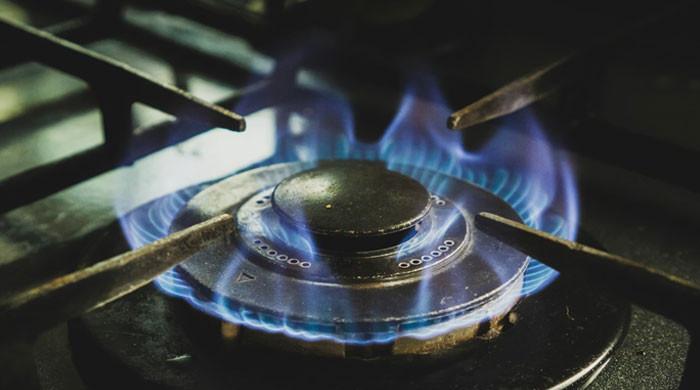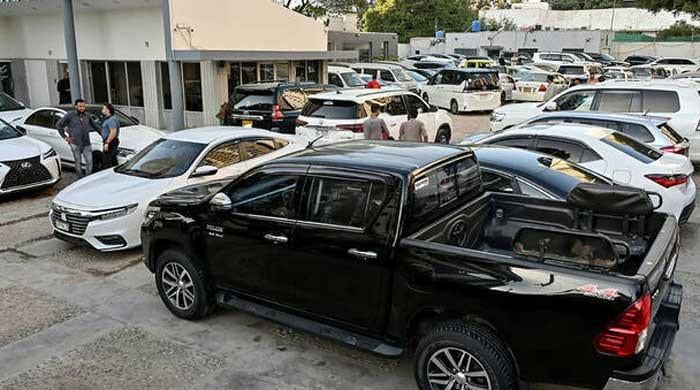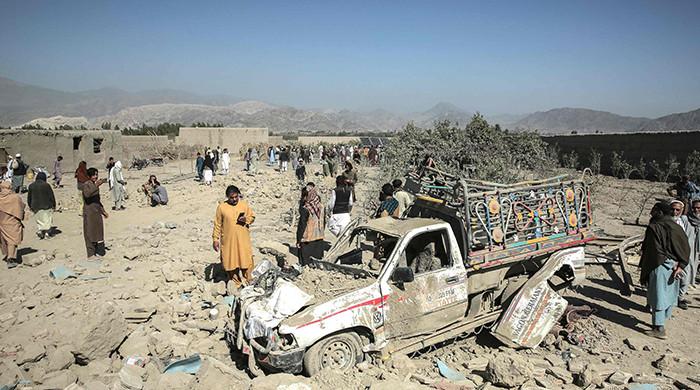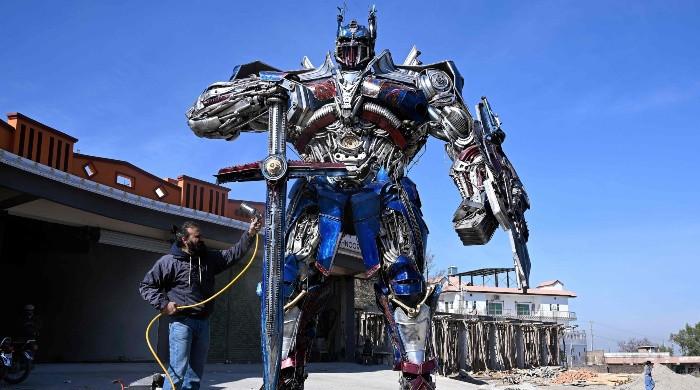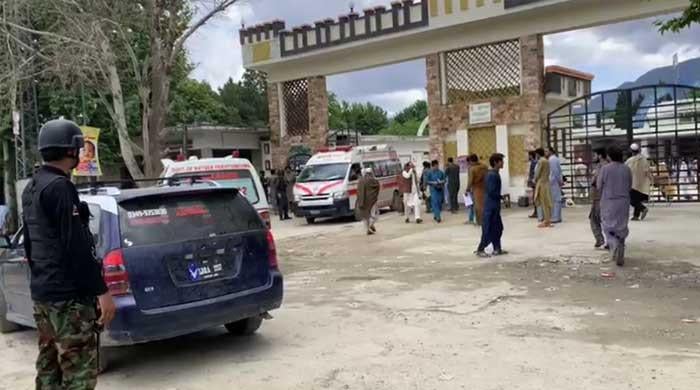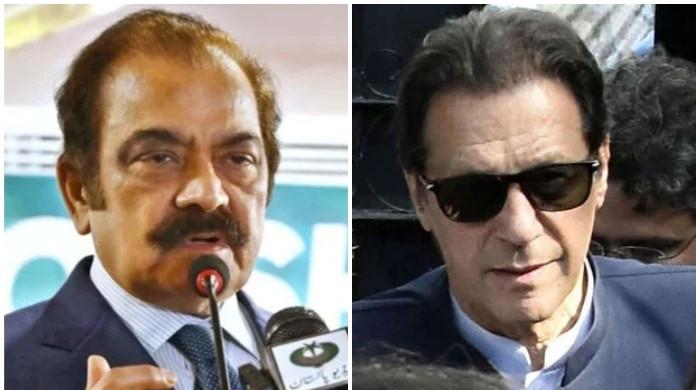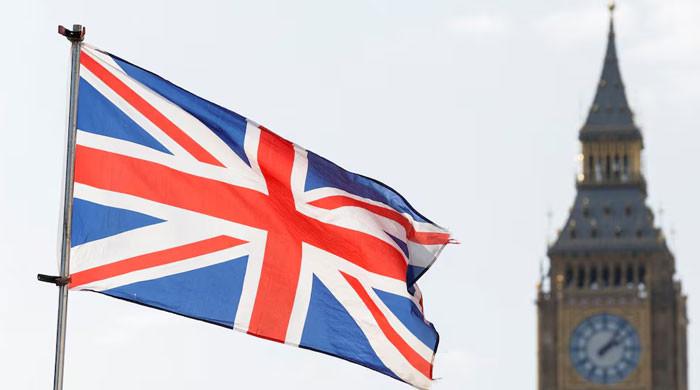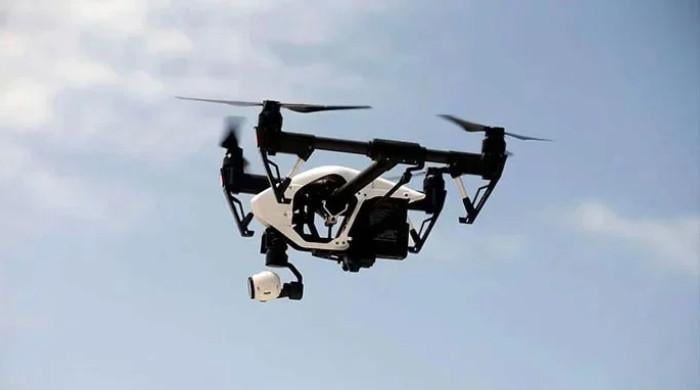'Terrorism': Police assault journalists after storming National Press Club
State Minister Talal Chaudhry visits NPC, tenders unconditional apology to journalists over incident
October 02, 2025
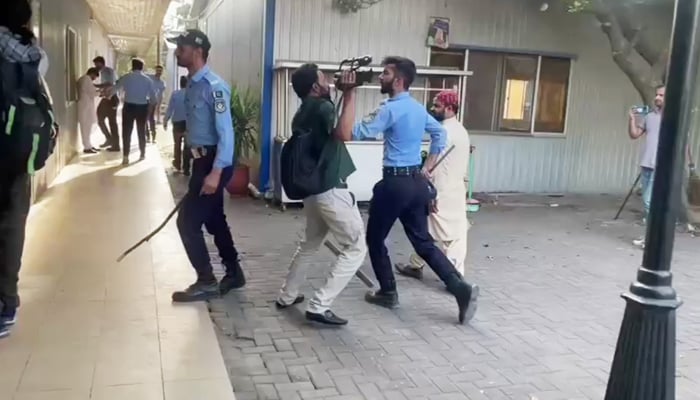
- Police damage property, smash cameras during raid.
- Journalists beaten inside cafeteria without any reason.
- Employees and office holders also targeted, arrested.
ISLAMABAD: Islamabad police stormed the National Press Club (NPC) on Thursday afternoon during a protest organised by the Awami Action Committee, assaulting journalists and damaging property in what senior media representatives described as one of the "worst incidents in history".
The protest was scheduled for around 3pm at the National Press Club. When demonstrators gathered outside, police arrested them.
The Awami Action Committee has been organising protests in the Azad Jammu and Kashmir (AJK), which turned violent and claimed the lives of at least nine people, three of them were police personnel.
The region is witnessing an overwhelming shutdown and wheeljam strike on the second consecutive day, a day earlier, amid intermittent skirmishes between law enforcers and activists in the state capital, Muzaffarabad.
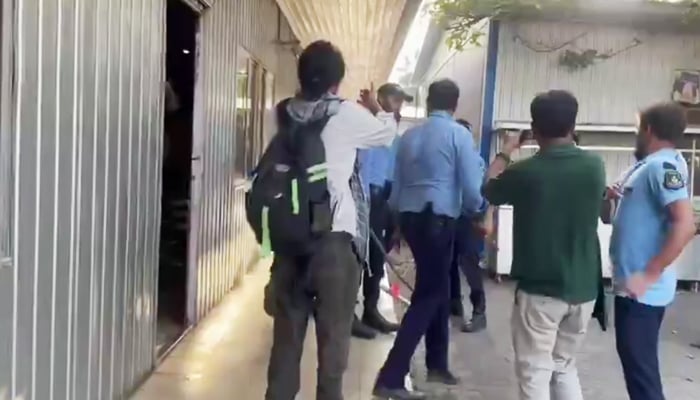
Journalists on the scene began documenting the events with photos and videos, but police attempted to stop them, even trying to snatch cameras and mobile phones.
Minutes after the police were asked not to manhandle media personnel by senior journalists, police personnel forced open the doors of the press club, with some climbing the walls and entering the building as if "terrorists were inside".
They attacked multiple journalists, smashed their equipment, and also stormed the cafeteria, beating journalists who were having tea.
Despite journalists repeatedly informing the police that no protesters were inside, the assault continued. Cameras were thrown to the ground, while media workers were assaulted.
Pakistan Federal Union of Journalists (PFUJ) President Afzal Butt condemned the incident, saying police broke NPC's furniture, assaulted both employees and office holders, and even arrested some of the staff.
He said the level of aggression displayed by police was unprecedented.
"Even during dictatorships, such behaviour was not witnessed. The police used to wait outside for a wanted person rather than raiding the Press Club," Butt remarked.
He warned that Islamabad police would have to answer for the violence, otherwise, journalists would launch a strong protest.
Meanwhile, journalists at the NPC were holding discussions on their next course of action following the assault.
The interior minister took notice of the incident and sought a report from the Islamabad police chief. Ordering a probe, Naqvi said that subjecting the journalists to torture would not be tolerated.
He also issued directives for disciplinary action against the responsible cops.
Federal Minister for Information and Broadcasting Attaullah Tarar vowed that an investigation would be conducted and action would be taken against those responsible for the unpleasant incident.
Condemning the incident, Karachi Press Club (KPC) President Fazil Jamili said the violation of NPC's sanctity was unacceptable. He also demanded accountability for those who tortured the journalists.
Furthermore, Pakistan People's Party (PPP) leader Shazia Marri, Peshawar Press Club (PPC) president, and general secretary have also condemned the incident.
Human Rights Commission of Pakistan (HRCP) demanded an "immediate inquiry and those responsible brought to book".
Journalist bodies term incident 'terrorism'
The journalists' organisations, issuing a joint statement, strongly condemned the police raid on the National Press Club (NPC) in Islamabad, describing it as an attack on press freedom and part of a wider campaign against journalists.
The Council of Pakistan Newspaper Editors (CPNE), PFUJ, and Association of Electronic Media Editors and News Directors (AEMEND) denounced the assault on journalists, calling the raid an act of "terrorism". They said the incident was a continuation of the ongoing actions against media workers.
The organisations demanded an end to smear campaigns, intimidation, and curbs on freedom of expression, stressing that journalists must be allowed to perform their professional duties without pressure.
The statement recalled that the media had acted responsibly during times of conflict, safeguarding national interests and defending the country's ideological frontiers.
It also rejected attempts to equate reporters and freelancers with terrorists, saying such measures violated the principles of free journalism.
The journalist bodies underlined that the Constitution guarantees citizens unhindered access to information. They warned that the indiscriminate misuse of the Prevention of Electronic Crimes Act (Peca) had already validated their longstanding concerns.
Vowing resistance at every level, the CPNE, PFUJ and AEMEND said they would use all constitutional and legal options to oppose actions taken against the media.




